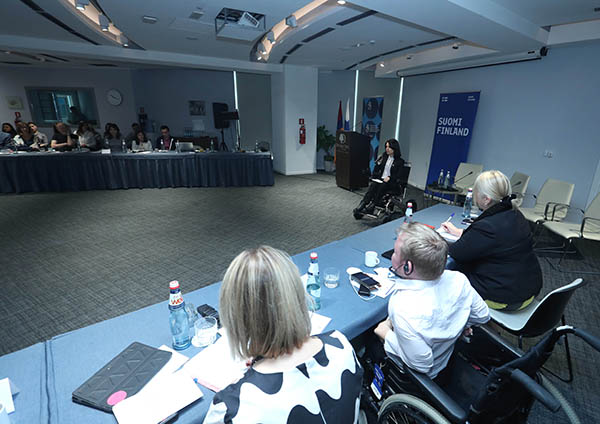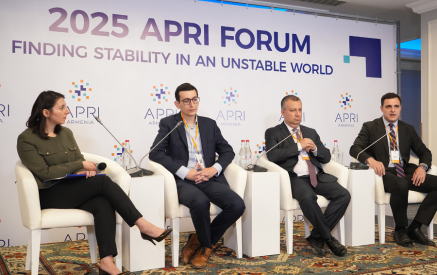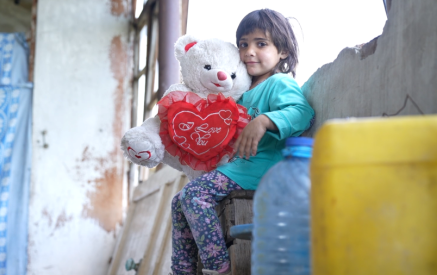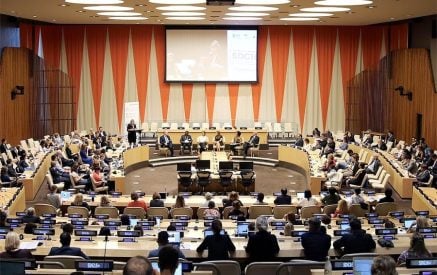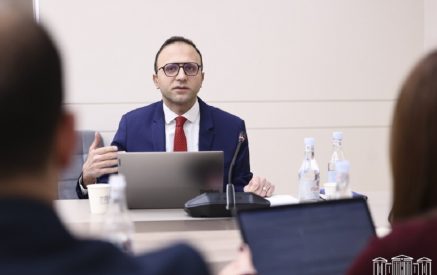The Armenian Weekly. When Arev Melkonyan went to her first prenatal checkup, she felt invisible. “The doctor ignored me completely,” she remembers.
Melkonyan was with a friend of hers, a friend whom the doctor immediately instructed to lie down on the examination table. After Melkonyan clarified that it was actually she who was pregnant, she heard: “Are you kidding me?”
“The doctor thought I was maybe subjected to violence or rape,” recalls Melkonyan, who uses a wheelchair.
Even accessing the second-floor gynecologist’s office was an insurmountable challenge for Melkonyan, whose examination was moved into a completely different part of the building on the first floor.
Read also
For the disability advocate, wife and mother, these experiences underscored the frustrating lack of awareness of a basic truth: people with disabilities (PWD) have the same fundamental needs, rights and desires as other humans do—they just need accommodations to help actualize them.
Melkonyan could have stayed quiet about her experience, viewing it as the perpetual status quo, or wallowed in self-pity. Instead, she became a proponent for change.
In Armenia, there is a swift undercurrent in the world of disability rights, and the most exciting facet of the change is that people with disabilities themselves are taking the lead. In accordance with the slogan “Nothing About Us Without Us,” those with disabilities and their family members are starting NGOs and engaging in advocacy to make Melkonyan’s experience, and others like it, a thing of the past.
At the November 1 Seminar on the Rights of Persons with Disabilities (PWD) organized by the Embassy of Finland in Yerevan, Melkonyan and other PWD shared their personal stories and perspectives on the pervasive issues facing them in Armenia. But the predominant message was one of hopeful perseverance.
“When it comes to disability rights, we’re all rather new,” said moderator and advocacy coordinator for Finland’s Ablis Foundation Tuomas Tuure.
In 1992, for example, the now inclusion-forward Finland had zero accessible public transportation options. Today, all buses and metros in the country accommodate people with a range of mobility issues, and the country is implementing inclusive education initiatives which began about 12 years ago. But Tuure says he doesn’t expect to see his benchmark of its success – higher PWD employment rates – for another 18 years or so. Tuure said the key is to identify where the PWD community is as a society, where it wants to be in about 30 years, and then strategically plan policies and actions steps to help achieve those goals.
PWD like Tuure, Melkonyan and others must be intimately involved in this process, which is what Ablis promotes, with a focus on the developing world. According to its website, the organization calls itself “a unique actor, channeling funding to projects that are planned, implemented and monitored by people with disabilities.” Active in 83 developing countries across the globe, Ablis currently finances more than 20 projects in Armenia.
Karine Grigoryan, a panelist, PWD and president of the Gyumri-based Agate Rights Defense Center for Women, shares Ablis’ vision. “We believe that in order for the rights of women with disabilities to be protected, women with disabilities should be aware of their rights, and they should be the ones talking about their rights,” she told the audience.
One year after Grigoryan experienced a life-changing training in the U.S. for women with disabilities, she felt empowered to take what she had learned and develop a much-needed resource center for women. Founded in 2007, Agate is now one of the leaders in disability advocacy in Armenia and is heavily involved in capacity building, training and general empowerment of women with disabilities. In 2017, after enacting 50 programs and impacting more than 1,000 people, the organization was awarded the “Franco-German Prize for Equal Chances” at the Universal Rights Award Ceremony in Yerevan.
One of Agate’s projects focused on the development of A Health Handbook for Women with Disabilities, a publication which included content on the sexual and reproductive health of women with disabilities. Published in 2013 with the support of the Norwegian Embassy, the book was criticized for being perverse.
But this perspective did not faze Grigoryan, and it certainly didn’t faze Melkonyan.
Vardine Grigoryan, a fellow panelist and representative of both the Helsinki Citizens’ Assembly in Vanadzor and the Disability-Inclusive Development NGO, argued that all laws and policies must consider disability issues. Laws protecting the right to health, she noted as an example, do not fully protect that right unless they take into account the special needs of people with disabilities to access health protection.
Grigoryan also underscored that PWD must therefore be involved in the policy creation process, “not as an exception, but as a norm.”
When PWD and their families are not consulted, efforts to promote inclusion can often go awry. Good intentions are not enough, and nowhere have they been more destructive than in the field of education in Armenia, where the 2016-onward closure of special schools for PWD and integration into mainstream schools have been problematic.
As Tuure noted, inclusive schools across the world encounter pushback for three primary reasons: 1) Teachers complain about increased workloads, 2) Parents of children with disabilities protest the discrimination their children face, and 3) Children are often “integrated” without appropriate support mechanisms.
Unfortunately, Armenia has faced all three problems. Dr. Marianna Harutyunyan, Head of the International Cooperation Unit and Associate Professor of Speech and Rehabilitative Therapy at Armenian State Pedagogical University, offered a descriptive analogy for the situation.
“You go to a very good, very expensive restaurant and you pay, but nobody asks what you want to eat. They just bring it,” she says. “This is what our government decided to do with inclusion reforms. They don’t ask the teacher, the parent or the child what they want to do, or what they need to have in their lives. They just bring the plate.”
The end result has been a double insult. Many in the government feel they have done a sufficient job, while those who are most intimately affected are worse off than they were before. This is a direct result of the flawed notion that a mainstream school is “inclusive” if it simply opens its doors to students with disabilities.
In reality, most schools in Armenia are physically inaccessible for students with mobility difficulties, few teachers have appropriate training to accommodate children with disabilities, and supportive devices – be they books in Braille, hearing aids or supportive chairs – are nearly non-existent.
“I think it is just a mess,” Harutyunyan says. As a professional in the field, it is especially difficult for her to see how research itself has been neglected in the process of policy change and implementation.
“If you look at the situation in the three regions of Armenia where the special schools were closed and reformulated into resource centers, many children do not attend school anymore,” Harutyunyan says.
While policymakers thought that opening mainstream schools to children with disabilities would reduce the burden on parents by providing a local schooling option for their children, Harutyunan says the reality is more complicated. “Many parents are thinking, my child does nothing in this mainstream school, but when he was in special school, he went to activities, he had a speech therapist, a special educator was working with him, and he was doing really well.”
In Harutyunyan’s personal opinion, the choice to attend a special school or a mainstream school should be left to individual families. It also hearkens back to Tuure’s broader questions: Where are we now, and where do we want to be in 30 years?
For Harutyunyan, the question is similar: “What is the basic aim of inclusive education?” she asks. “Is it academic or social?”
The answer is bound to vary by family situation and severity of disability; people with disabilities cannot be lumped into one category. And that, again, is why it is so vital to include their voices in the conversation.
Both Tuure, a person with disabilities, and Harutyunyan, a highly educated researcher and therapist, appreciate the model wherein children with disabilities have a special place within an integrated school to receive therapies or engage in learning activities. In this way, both academic and social goals can be reached.
“The main approach should be to create opportunities,” Vardine Grigoryan concluded at the end of her panel speech. While PWD, for example, may not take advantage of their civil right to vote, to bear children or to attend mainstream schools, they should never be prevented from doing so by their inability to even access the polls, the doctor’s office or the classroom.
As these opportunities slowly develop, disability advocates are working hard to gather their stories, ideas, projects and proposals and play an active role in the process of change.
“We should not be treated as beneficiaries only,” says Melkonyan, now the mother of a beautiful daughter. “We are full-fledged citizens.”
Sarah Stites
Photo. Zaruhi Batoyan, the Minister of Labor and Social Affairs, delivering her formal remarks.




















































